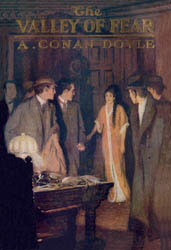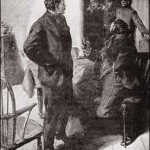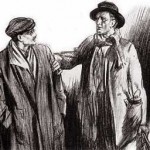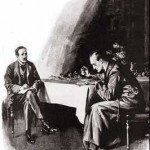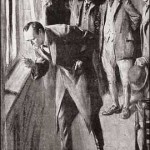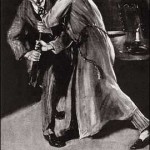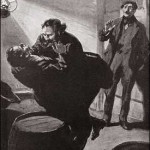It was the height of the reign of terror. McMurdo, who had already been appointed Inner Deacon, with every prospect of some day succeeding McGinty as Bodymaster, was now so necessary to the councils of his comrades that nothing was done without his help and advice. The more popular he became, however, with the Freemen, the blacker were the scowls which greeted him as he passed along the streets of Vermissa. In spite of their terror the citizens were taking heart to band themselves together against their oppressors. Rumours had reached the lodge of secret gatherings in the Herald office and of distribution of firearms among the law-abiding people. But McGinty and his men were undisturbed by such reports. They were numerous, resolute, and well armed. Their opponents were scattered and powerless. It would all end, as it had done in the past, in aimless talk and possibly in impotent arrests. So said McGinty, McMurdo, and all the bolder spirits.
It was a Saturday evening in May. Saturday was always the lodge night, and McMurdo was leaving his house to attend it when Morris, the weaker brother of the order, came to see him. His brow was creased with care, and his kindly face was drawn and haggard.
“Can I speak with you freely, Mr. McMurdo?”
“Sure.”
“I can’t forget that I spoke my heart to you once, and that you kept it to yourself, even though the Boss himself came to ask you about it.”
“What else could I do if you trusted me? It wasn’t that I agreed with what you said.”
“I know that well. But you are the one that I can speak to and be safe. I’ve a secret here,” he put his hand to his breast, “and it is just burning the life out of me. I wish it had come to any one of you but me. If I tell it, it will mean murder, for sure. If I don’t, it may bring the end of us all. God help me. but I am near out of my wits over it!”
McMurdo looked at the man earnestly. He was trembling in every limb. He poured some whisky into a glass and handed it to him. “That’s the physic for the likes of you,” said he. “Now let me hear of it.”
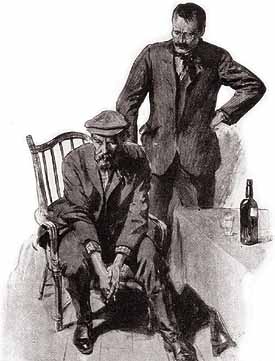
Morris drank, and his white face took a tinge of colour. “I can tell it to you all in one sentence,” said he. “There’s a detective on our trail.”
McMurdo stared at him in astonishment. “Why, man, you’re crazy,” he said. “Isn’t the place full of police and detectives and what harm did they ever do us?”
“No, no, it’s no man of the district. As you say, we know them, and it is little that they can do. But you’ve heard of Pinkerton’s?”
“I’ve read of some folk of that name.”
“Well, you can take it from me you’ve no show when they are on your trail. It’s not a take-it-or-miss-it government concern. It’s a dead earnest business proposition that’s out for results and keeps out till by hook or crook it gets them. If a Pinkerton man is deep in this business, we are all destroyed.”
“We must kill him.”
“Ah, it’s the first thought that came to you! So it will be up at the lodge. Didn’t I say to you that it would end in murder?”
“Sure, what is murder? Isn’t it common enough in these parts?”
“It is, indeed; but it’s not for me to point out the man that is to be murdered. I’d never rest easy again. And yet it’s our own necks that may be at stake. In God’s name what shall I do?” He rocked to and fro in his agony of indecision.
But his words had moved McMurdo deeply. It was easy to see that he shared the other’s opinion as to the danger, and the need for meeting it. He gripped Morris’s shoulder and shook him in his earnestness.
“See here, man,” he cried, and he almost screeched the words in his excitement, “you won’t gain anything by sitting keening like an old wife at a wake. Let’s have the facts. Who is the fellow? Where is he? How did you hear of him? Why did you come to me?”
“I came to you; for you are the one man that would advise me. I told you that I had a store in the East before I came here. I left good friends behind me, and one of them is in the telegraph service. Here’s a letter that I had from him yesterday. It’s this part from the top of the page. You can read it yourself.”
This was what McMurdo read:
How are the Scowrers getting on in your parts? We read plenty of them in the papers. Between you and me I expect to hear news from you before long. Five big corporations and the two railroads have taken the thing up in dead earnest. They mean it, and you can bet they’ll get there! They are right deep down into it. Pinkerton has taken hold under their orders, and his best man, Birdy Edwards, is operating. The thing has got to be stopped right now. “Now read the postscript.” Of course, what I give you is what I learned in business; so it goes no further. It’s a queer cipher that you handle by the yard every day and can get no meaning from.
McMurdo sat in silence for some time, with the letter in his listless hands. The mist had lifted for a moment, and there was the abyss before him.
“Does anyone else know of this?” he asked.
“I have told no one else.”
“But this man — your friend — has he any other person that he would be likely to write to?”
“Well, I dare say he knows one or two more.”
“Of the lodge?”
“It’s likely enough.”
“I was asking because it is likely that he may have given some description of this fellow Birdy Edwards — then we could get on his trail.”
“Well, it’s possible. But I should not think he knew him. He is just telling me the news that came to him by way of business. How would he know this Pinkerton man?”
McMurdo gave a violent start.
“By Gar!” he cried, “I’ve got him. What a fool I was not to know it. Lord! but we’re in luck! We will fix him before he can do any harm. See here, Morris, will you leave this thing in my hands?”
“Sure, if you will only take it off mine.”
“I’ll do that. You can stand right back and let me run it. Even your name need not be mentioned. I’ll take it all on myself, as if it were to me that this letter has come. Will that content you?”
“It’s just what I would ask.”
“Then leave it at that and keep your head shut. Now I’ll get down to the lodge, and we’ll soon make old man Pinkerton sorry for himself.”
“You wouldn’t kill this man?”
“The less you know, Friend Morris, the easier your conscience will be, and the better you will sleep. Ask no questions, and let these things settle themselves. I have hold of it now.”
Morris shook his head sadly as he left. “I feel that his blood is on my hands,” he groaned.
“Self-protection is no murder, anyhow,” said McMurdo, smiling grimly. “It’s him or us. I guess this man would destroy us all if we left him long in the valley. Why, Brother Morris, we’ll have to elect you Bodymaster yet; for you’ve surely saved the lodge.”
And yet it was clear from his actions that he thought more seriously of this new intrusion than his words would show. It may have been his guilty conscience, it may have been the reputation of the Pinkerton organization, it may have been the knowledge that great, rich corporations had set themselves the task of clearing out the Scowrers; but, whatever his reason, his actions were those of a man who is preparing for the worst. Every paper which would incriminate him was destroyed before he left the house. After that he gave a long sigh of satisfaction; for it seemed to him that he was safe. And yet the danger must still have pressed somewhat upon him; for on his way to the lodge he stopped at old man Shafter’s. The house was forbidden him; but when he tapped at the window Ettie came out to him. The dancing Irish deviltry had gone from her lover’s eyes. She read his danger in his earnest face.
“Something has happened!” she cried. “Oh, Jack, you are in danger!”
“Sure, it is not very bad, my sweetheart. And yet it may be wise that we make a move before it is worse.”
“Make a move?”
“I promised you once that I would go some day. I think the time is coming. I had news to-night, bad news, and I see trouble coming.”
“The police?”
“Well, a Pinkerton. But, sure, you wouldn’t know what that is, acushla, nor what it may mean to the likes of me. I’m too deep in this thing, and I may have to get out of it quick. You said you would come with me if I went.”
“Oh, Jack, it would be the saving of you!”
“I’m an honest man in some things, Ettie. I wouldn’t hurt a hair of your bonny head for all that the world can give, nor ever pull you down one inch from the golden throne above the clouds where I always see you. Would you trust me?”
She put her hand in his without a word. “Well, then, listen to what I say, and do as I order you, for indeed it’s the only way for us. Things are going to happen in this valley. I feel it in my bones. There may be many of us that will have to look out for ourselves. I’m one, anyhow. If I go, by day or night, it’s you that must come with me!”
“I’d come after you, Jack.”
“No, no, you shall come with me. If this valley is closed to me and I can never come back, how can I leave you behind, and me perhaps in hiding from the police with never a chance of a message? It’s with me you must come. I know a good woman in the place I come from, and it’s there I’d leave you till we can get married. Will you come?”
“Yes, Jack, I will come.”
“God bless you for your trust in me! It’s a fiend out of hell that I should be if I abused it. Now, mark you, Ettie, it will be just a word to you, and when it reaches you, you will drop everything and come right down to the waiting room at the depot and stay there till I come for you.”
“Day or night, I’ll come at the word, Jack.”
Somewhat eased in mind, now that his own preparations for escape had been begun, McMurdo went on to the lodge. It had already assembled, and only by complicated signs and countersigns could he pass through the outer guard and inner guard who close-tiled it. A buzz of pleasure and welcome greeted him as he entered. The long room was crowded, and through the haze of tobacco smoke he saw the tangled black mane of the Bodymaster the cruel, unfriendly features of Baldwin, the vulture face of Harraway, the secretary, and a dozen more who were among the leaders of the lodge. He rejoiced that they should all be there to take counsel over his news.
“Indeed, it’s glad we are to see you, Brother!” cried the chairman. “There’s business here that wants a Solomon in judgment to set it right.”
“It’s Lander and Egan,” explained his neighbour as he took his seat. “They both claim the head money given by the lodge for the shooting of old man Crabbe over at Stylestown, and who’s to say which fired the bullet?”
McMurdo rose in his place and raised his hand. The expression of his face froze the attention of the audience. There was a dead hush of expectation.
“Eminent Bodymaster,” he said, in a solemn voice, “I claim urgency!”
“Brother McMurdo claims urgency,” said McGinty. “It’s a claim that by the rules of this lodge takes precedence. Now Brother, we attend you.”
McMurdo took the letter from his pocket.
“Eminent Bodymaster and Brethren,” he said, “I am the bearer of ill news this day; but it is better that it should be known and discussed, than that a blow should fall upon us without warning which would destroy us all. I have information that the most powerful and richest organizations in this state have bound themselves together for our destruction, and that at this very moment there is a Pinkerton detective, one Birdy Edwards, at work in the valley collecting the evidence which may put a rope round the necks of many of us, and send every man in this room into a felon’s cell. That is the situation for the discussion of which I have made a claim of urgency.”
There was a dead silence in the room. It was broken by the chairman.
“What is your evidence for this, Brother McMurdo?” he asked.
“It is in this letter which has come into my hands,” said McMurdo. Me read the passage aloud. “It is a matter of honour with me that I can give no further particulars about the letter, nor put it into your hands; but I assure you that there is nothing else in it which can affect the interests of the lodge. I put the case before you as it has reached me.”
“Let me say, Mr. Chairman,” said one of the older brethren, “that I have heard of Birdy Edwards, and that he has the name of being the best man in the Pinkerton service.”
“Does anyone know him by sight?” asked McGinty.
“Yes,” said McMurdo, “I do.”
There was a murmur of astonishment through the hall.
“I believe we hold him in the hollow of our hands,” he continued with an exulting smile upon his face. “If we act quickly and wisely, we can cut this thing short. If I have your confidence and your help, it is little that we have to fear.”
“What have we to fear, anyhow? What can he know of our affairs?”
“You might say so if all were as stanch as you, Councillor. But this man has all the millions of the capitalists at his back. Do you think there is no weaker brother among all our lodges that could not be bought? He will get at our secrets — maybe has got them already. There’s only one sure cure.”
“That he never leaves the valley,” said Baldwin.
McMurdo nodded. “Good for you, Brother Baldwin,” he said. “You and I have had our differences, but you have said the true word to-night.”
“Where is he, then? Where shall we know him?”
“Eminent Bodymaster,” said McMurdo, earnestly, “I would put it to you that this is too vital a thing for us to discuss in open lodge. God forbid that I should throw a doubt on anyone here; but if so much as a word of gossip got to the ears of this man, there would be an end of any chance of our getting him. I would ask the lodge to choose a trusty committee, Mr. Chairman — yourself, if I might suggest it, and Brother Baldwin here, and five more. Then I can talk freely of what I know and of what I advise should be done.”
The proposition was at once adopted, and the committee chosen. Besides the chairman and Baldwin there were the vulture-faced secretary, Harraway, Tiger Cormac, the brutal young assassin, Carter, the treasurer, and the brothers Willaby, fearless and desperate men who would stick at nothing.
The usual revelry of the lodge was short and subdued: for there was a cloud upon the men’s spirits, and many there for the first time began to see the cloud of avenging Law drifting up in that serene sky under which they had dwelt so long. The horrors they had dealt out to others had been so much a part of their settled lives that the thought of retribution had become a remote one, and so seemed the more startling now that it came so closely upon them. They broke up early and left their leaders to their council.
“Now, McMurdo!” said McGinty when they were alone. The seven men sat frozen in their seats.
“I said just now that I knew Birdy Edwards,” McMurdo explained. “I need not tell you that he is not here under that name. He’s a brave man, but not a crazy one. He passes under the name of Steve Wilson, and he is lodging at Hobson’s Patch.”
“How do you know this?”
“Because I fell into talk with him. I thought little of it at the time, nor would have given it a second thought but for this letter; but now I’m sure it’s the man. I met him on the cars when I went down the line on Wednesday — a hard case if ever there was one. He said he was a reporter. I believed it for the moment. Wanted to know all he could about the Scowrers and what he called ‘the outrages’ for a New York paper. Asked me every kind of question so as to get something. You bet I was giving nothing away. ‘I’d pay for it and pay well,’ said he, ‘if I could get some stuff that would suit my editor.’ I said what I thought would please him best, and he handed me a twenty-dollar bill for my information. ‘There’s ten times that for you,’ said he, ‘if you can find me all that I want.’ ”
“What did you tell him, then?”
“Any stuff I could make up.”
“How do you know he wasn’t a newspaper man?”
“I’ll tell you. He got out at Hobson’s Patch, and so did I. I chanced into the telegraph bureau, and he was leaving it.
” ‘See here,’ said the operator after he’d gone out, ‘I guess we should charge double rates for this.’ — ‘I guess you should,’ said I. He had filled the form with stuff that might have been Chinese, for all we could make of it. ‘He fires a sheet of this off every day,’ said the clerk. ‘Yes,’ said I; ‘it’s special news for his paper, and he’s scared that the others should tap it.’ That was what the operator thought and what I thought at the time; but I think differently now.”
“By Gar! I believe you are right,” said McGinty. “But what do you allow that we should do about it?”
“Why not go right down now and fix him?” someone suggested.
“Ay, the sooner the better.”
“I’d start this next minute if I knew where we could find him,” said McMurdo. “He’s in Hobson’s Patch; but I don’t know the house. I’ve got a plan, though, if you’ll only take my advice.”
“Well, what is it?”
“I’ll go to the Patch to-morrow morning. I’ll find him through the operator. He can locate him, I guess. Well, then I’ll tell him that I’m a Freeman myself. I’ll offer him all the secrets of the lodge for a price. You bet he’ll tumble to it. I’ll tell him the papers are at my house, and that it’s as much as my life would be worth to let him come while folk were about. He’ll see that that’s horse sense. Let him come at ten o’clock at night, and he shall see everything. That will fetch him sure.”
“Well?”
“You can plan the rest for yourselves. Widow MacNamara’s is a lonely house. She’s as true as steel and as deaf as a post. There’s only Scanlan and me in the house. If I get his promise — and I’ll let you know if I do — I’d have the whole seven of you come to me by nine o’clock. We’ll get him in. If ever he gets out alive — well, he can talk of Birdy Edwards’s luck for the rest of his days!”
“There’s going to be a vacancy at Pinkerton’s or I’m mistaken. Leave it at that, McMurdo. At nine to-morrow we’ll be with you. You once get the door shut behind him, and you can leave the rest with us.”

